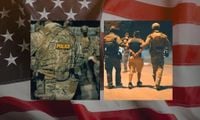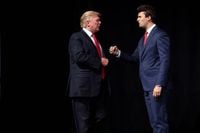On September 21, 2025, the cavernous State Farm Stadium in Glendale, Arizona, was transformed into a striking tableau of grief, patriotism, and political theater. Tens of thousands gathered—many donning MAGA hats and waving American flags—to mourn Charlie Kirk, the influential conservative activist and founder of Turning Point USA, who was fatally shot just eleven days prior during a speaking event at Utah Valley University in Orem, Utah. But the service was more than a memorial; it became a stage for President Donald Trump to both honor Kirk and reignite a fierce debate about crime and federal intervention in Chicago.
In a 40-minute speech that blended eulogy with political rally, Trump lionized Kirk as a “great American hero” and a “martyr,” according to NBC Chicago. He recounted their final conversation, telling the crowd, “One of the last things he said to me is, ‘Please, sir, save Chicago.’ We are going to do that. We are going to save Chicago from horrible crime.” The remarks drew raucous applause, as Trump’s words echoed the hardline vision Kirk himself had championed in life. Only a month prior, Kirk had declared on his podcast, “I want to be able to walk Magnificent Mile in Chicago without having to look over my shoulder. We got a big military. We should be willing to use it.”
Trump’s eulogy did not shy away from controversy. He again hinted at deploying the National Guard to Chicago, a move he has floated for weeks but which legal scholars have called dubious. “We’re going to have Charlie very much in mind when we go into Chicago, and we’ll get that one straightened out,” Trump vowed, as reported by Block Club Chicago. His rhetoric signaled a willingness to use aggressive federal measures in response to what he described as rampant crime, despite strong opposition from Illinois’ Democratic leadership.
That opposition was swift and pointed. Illinois Governor JB Pritzker, in a social media post on September 20, made it clear that the state was not coordinating with the federal government’s recent actions. “Despite refusing to coordinate with the state or city, we’re monitoring the ongoing federal deployments that are instilling fear in our communities,” Pritzker wrote. “Americans have a right to peaceful assembly and to make their voices heard. Even if the Trump admin won’t follow the law, we will.” The governor’s criticism didn’t end there. In remarks to NBC Chicago, Pritzker questioned Trump’s consistency on the issue, saying, “Sometimes he attacks sending his agents in, sometimes he forgets. I think he might be suffering from some dementia, you know?”
The tension between state and federal authorities was already running high. Just two days before the memorial, federal immigration agents had arrested nearly 550 people in the Chicago area as part of Operation Midway Blitz, a ramped-up enforcement action. The Associated Press reported that on September 19, outside an ICE processing facility in suburban Broadview, ten protesters clashed with federal agents. The agents responded with tear gas and pepper balls as some demonstrators tried to block entrances. All ten were later released from custody, but the chaotic scene underscored the volatility surrounding federal interventions in the city.
At the heart of the memorial, however, was not just a debate over law and order, but a profound reflection on the legacy of Charlie Kirk. The service, attended by Vice-President JD Vance and a host of high-profile conservative officials, was as much a celebration of Kirk’s activism as it was a mourning of his loss. Trump, in a moment that blended reverence with political messaging, described Kirk as “our greatest evangelist for American liberty,” a phrase reported by BBC. He told the assembled crowd that Kirk was now “immortalized as a martyr,” cementing his place in the conservative movement’s pantheon.
Kirk’s wife, Erika, brought a different tone to the proceedings. In her remarks, she emphasized forgiveness—even towards her husband’s alleged killer. According to BBC, Erika said, “We are called to respond to hate not with more hate, but with forgiveness.” Her message stood in stark contrast to Trump’s own admission during the service: “I hate my opponent and I don’t want the best for them.” This dichotomy between calls for compassion and the hard-edged rhetoric of political rivalry was palpable throughout the event, reflecting the broader divisions within American society.
The memorial service itself had the atmosphere of a political rally, with speakers urging attendees to continue Kirk’s mission. Turning Point USA, the organization Kirk founded, has been at the forefront of conservative youth activism, advocating for limited government, free markets, and strong national defense. Kirk’s sudden death sent shockwaves through the movement, with many seeing his assassination as both a personal tragedy and a rallying cry for renewed activism.
Trump’s decision to spotlight Kirk’s plea to “save Chicago” was no accident. The city has long been a focal point in national debates over crime, policing, and federal authority. By invoking Kirk’s final words, Trump sought to tie his own political agenda to the memory of a conservative icon, galvanizing supporters and drawing a stark line between his administration’s approach and that of local Democratic officials. As reported by Block Club Chicago, Trump told the crowd, “We’re gonna go to Chicago and we’re gonna have Charlie very much in mind when we go into Chicago and we’ll get that one straightened out.”
Yet, the path forward remains fraught. Legal experts have repeatedly questioned the president’s authority to deploy the National Guard to a city without state approval. Local leaders, including Governor Pritzker, have vowed to resist any such intervention, arguing that it would escalate tensions and undermine community trust. The recent federal arrests and the violent confrontation in Broadview have only heightened these concerns, with critics warning that heavy-handed tactics could do more harm than good.
For many mourners in Arizona, however, the focus was on honoring Kirk’s life and the ideals he championed. The event was a testament to the enduring power of political movements to shape narratives—even in moments of profound loss. As Vice-President JD Vance and other speakers took the stage, the message was clear: Kirk’s vision for America, including his uncompromising stance on law and order, would live on through the actions of those he inspired.
In the days since the memorial, the debate over Chicago’s future has only intensified. Trump’s promises, Pritzker’s resistance, and the memory of Charlie Kirk now converge in a city grappling with questions of safety, justice, and the limits of federal power. As the nation watches, the legacy of one activist’s final plea—“Please, sir, save Chicago”—continues to reverberate far beyond the walls of State Farm Stadium.



